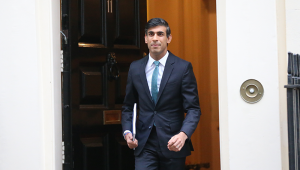The OBR’s Economic and Fiscal Outlook, published today, revealed that, as a percentage of gross domestic product, public sector net debt is set to rise from 83.3% in 2014/15 to 83.7% in 2015/16, breaching Osborne’s rule that debt should fall year on year.
However, in his statement to MPs, Osborne was at pains to point out that, in cash terms, debt was falling. He blamed what he called this “paradoxical result” to an economy that was smaller than expected.
“In cash terms the national debt is lower than it was forecast to be in the autumn, but so too is the nominal size of our economy,” he said.
“So while debt as a percentage of GDP is above target and set to be higher in 2015/16 than the year before. Compared to the forecast, the actual level of our national debt in cash is £9bn lower.”
According to the OBR, the economy is expected to grow by 2% this year and 2.2% in 2017. This is down from the 2.4% and 2.5% growth for 2016 and 2017 predicted by the OBR in the November Autumn Statement.
Welfare spending is also set to be higher than the cash limit set out in the 2015 Budget in every year of the Parliament, the OBR reported.
However, there was better news for the chancellor on his central fiscal mandate – to deliver a budget surplus in 2019/20 and each year subsequently. On this, the OBR confirmed that Osborne was on track to deliver.
“In the absence of any policy measures in this Budget, the government would have been on course for small deficits in 2019/20 (£3.2bn) and 2020/21 (£2.0bn), breaching the fiscal mandate,” the OBR said.
“But the government’s Budget policy measures raise £13.7bn in 2019/20 and £13.1bn in 2020/21, broadly offsetting the deterioration in the underlying forecast and putting it back on course to meet the surplus target by £10.4bn and £11.0bn respectively. We therefore judge that the government is more likely than not to meet its target on existing policy, but with a margin that is small in comparison with the uncertainty that surrounds our fiscal forecast at that horizon.”




















